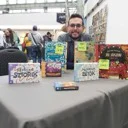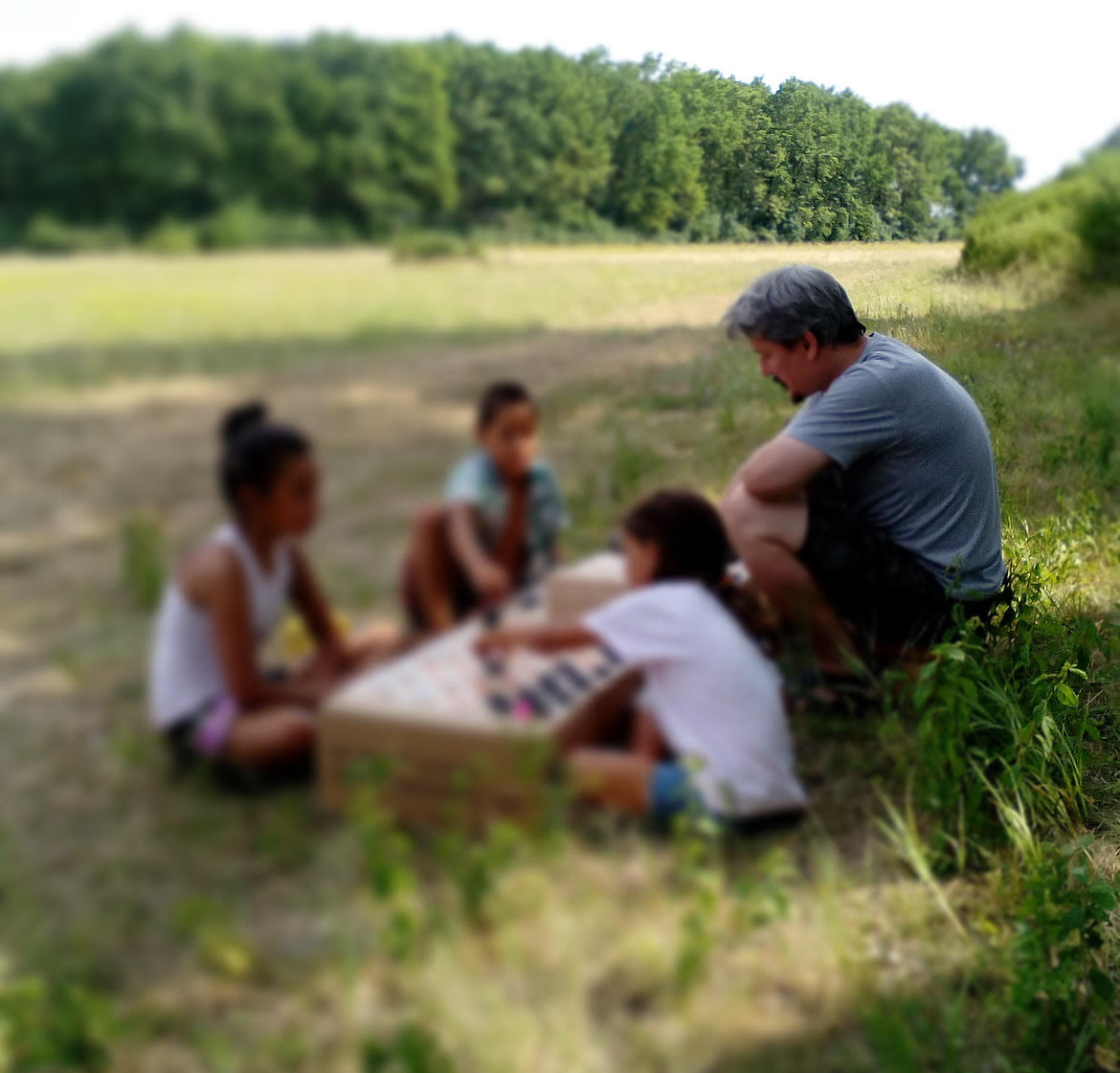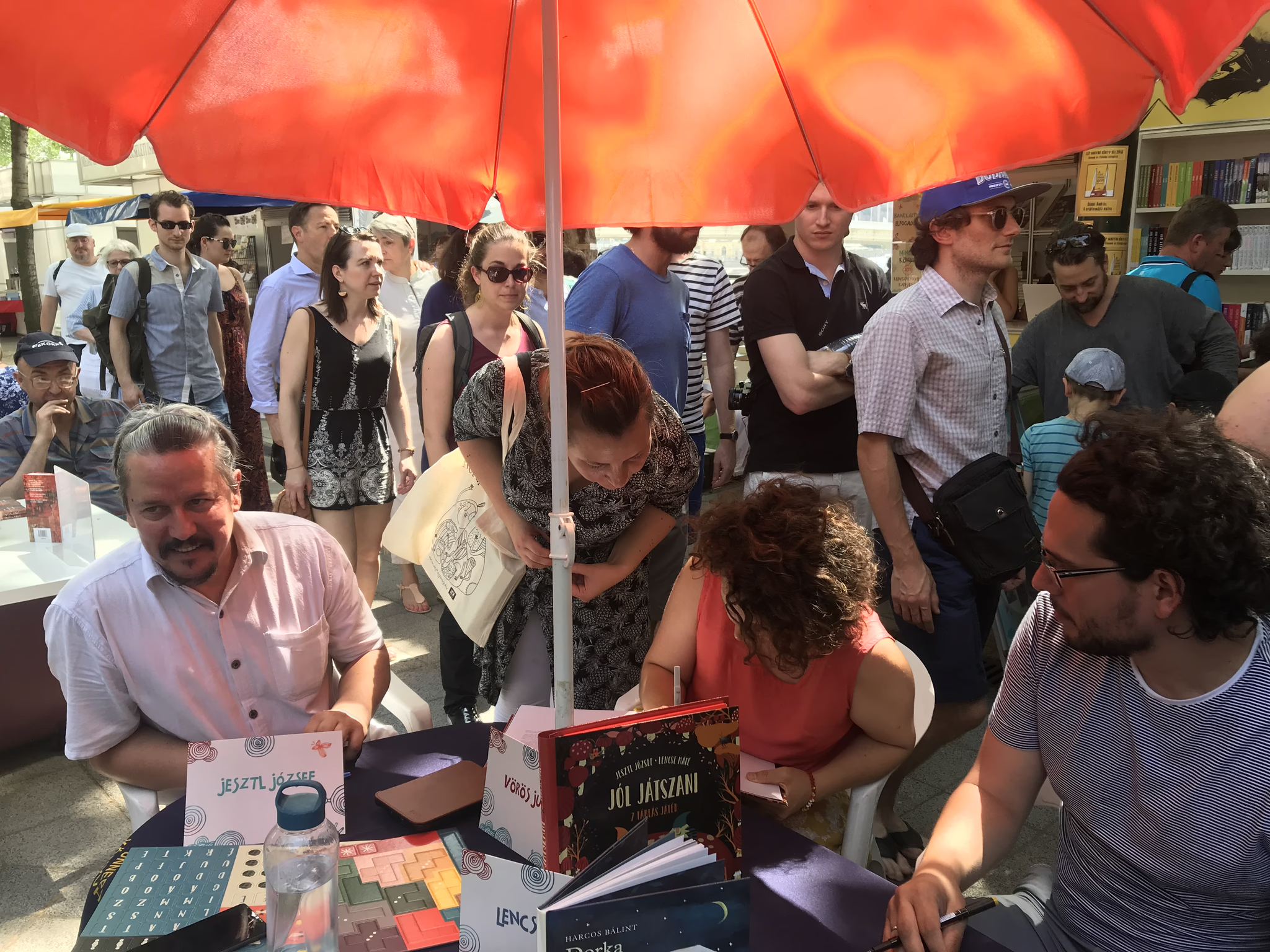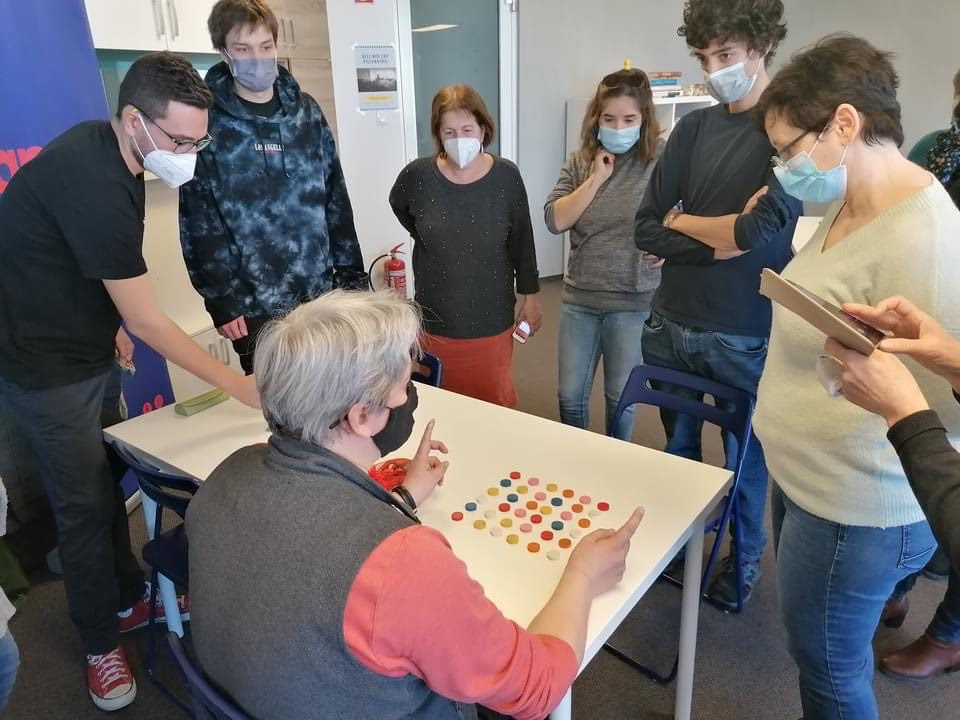Conversation with József Jesztl
I've learned a lot from József Jesztl, and I'm very proud that we've co-authored four board game books together.

Máté Lencse
Educator, game designer, founder of PlayWise

You might not know, but a little over ten years ago, on February 6, 2013, I sent you an email asking for your help to provide meaningful leisure activities for the kids in Told at zero cost. Then we had several training sessions, and the rest is history. My first question would be, what do you remember about the beginning of our story? What games did we play, and what immediately clicked with the group?
My first impressions were very positive because I saw that you were doing something in Hungary that I was also struggling with in the eighth district, trying to gather knowledge from all over the world. What I remember most is that we looked at what games could be played with very little money, and in the beginning, we learned a lot about these games. And there was this sense of wonder from those attending the training sessions at how exciting these very simple games could be in certain situations.


I actually found the list we made for you of the games we were using, and it included things like Nine Men's Morris, Activity, Uno cards—so we had gathered 8-10 very basic things, which is quite funny compared to today's after-school program. But yes, I also remember those simple games, and something many of us fondly recall is that we called Pit "Stock Exchange" and the person who collected the cards had to stomp on a balloon. Do you remember what the hit game was when you first came to Told?
By then, you had already infected the older boys with Tichu.


Yes, Tichu was very popular, but what did you bring?
I think I was playing checkers with the kids.


That's right! We have a very iconic picture that we love to show: you're sitting outside in a tiny patch of shade, in the brush, on the grass...
At the edge of the honorary football field...


Yes, exactly, and you're playing checkers on cardboard boxes. This came to mind because we learned from you, and we've often discussed since, that board games can be played anywhere. Can you tell us about an interesting place where you've played games with children?
When I was taking kids from point A to point B, there's a typical story of missing the bus and needing to structure the time somehow in a bus stop. So there were times when we symbolically left two kids reading with our luggage at the bus stop while the rest of us moved to a field. The kids who needed to move played Pit with a deck of cards, while those who were already tired played Pig with dice. These are two stories where, if you find yourself with 30 minutes of free time, you can quickly organize a tournament with one or play two rounds with the other. Another quick and easy game is Liar!, which only needs nine cards. It can be played very well with a larger group. Another general favorite that kids get hooked on, so much so that you end up begging for mercy not to play it anymore, is Word Bridge. You start it on a forest hike with two or three kids, and the others become curious about why the usually chatty kid is suddenly quietly looking at rocks and thinking—because they can only say one word at a time. This becomes so interesting that we start a new game, more people join in, and from then on, in that camp, whenever we go for dinner, there's always a demand to quickly play a round of Word Bridge.


Games can be played anywhere

Learning through play

Expert insights

This is also a typical story that you wouldn't believe until you experience it yourself. Recently, I was involved in a conversation about "kids these days" and how you can't get them to sit down and play because of digital devices and all that. But that's simply not true. I have no experience where it was impossible to find a way to engage someone. Obviously, the path is different for everyone—some are straightforward, others are rough—but if I were to describe what Word Bridge is, few would vote that it would be popular with kids. Yet, here's this story. So, what's the one story that comes to mind for you when asked about the pedagogical benefits of board gaming?
There was a boy who we knew had great abilities, but he wasn't sharp in mathematical areas. He understood logical things, but numerical aspects repelled him, and he had inhibitions. I played Terra Mystica with him in a multiplayer setting—a game that's a real math killer. He liked it so much that we started playing it one-on-one. And yesterday, this kid schooled me in the game. I had no idea what his strategy was. My opinion was that it wasn't possible to achieve what he was attempting with that particular faction, but two rounds before the end, he declared like a grandmaster that I was going to lose. I looked at the board and thought it was impossible. In the end, he beat me by over twenty points, and he already knew it.
What was exciting was seeing how he bypassed all the calculations, using probability, which he had a knack for. He had a sense of timing—knowing that I wouldn't be able to achieve something because there wouldn't be enough time, but he would still manage to do it. These two factors bridged a very strong element, namely mathematical skills: calculating, remembering results, trying to shortcut using math. Essentially, he hacked the game.


This really resonates with what we realized while writing our book "Board Game Education," about the leveling of developmental areas. The highest level is very similar to the lowest. We reach a point where we calculate things, see things clearly, plan precisely, everything is mathematically worked out, and then we have to go beyond that to be truly effective. This is the somewhat intuitive level of board gaming.
Yes, at the beginning we use intuition because we lack experience in that game, so we do something intuitively by transferring knowledge from other areas of life into the game. And after a while, as we get to know the ins and outs of a game, our intuitive decisions are supported by our stronger familiarity with the game.


And how beautiful it is that there's something I don't understand, don't know, or am uncertain about, but I can find alternative paths, and board games reward this, unlike our education system.
Another story came to mind, may I share it?


Of course, we're collecting stories!
We were playing cards. Many families were in one place, and you could see those faces eager to play something beyond party games, something a bit deeper. So, we taught a young boy how to play Tichu, and then he taught his family. Everyone got hooked on it, and they always had the perfect number of players for Tichu. Now the great thing is that the boy specifically asks his family for permission to come and play Tichu with us. He sees that it's a kind of connection or environment where you can be in such social situations. It's like a mutual understanding: I love playing cards, you love playing cards, what shall we play?


This is what we constantly seek as parents or educators—how to support children in being proactive and creating their own gaming situations. And they can do it.
And imagine, what I also see is that kids I draw into gaming situations eventually believe that it's good to learn new things. After a while, they become problem-seekers because they realize that solving a problem is beneficial for them. And I get feedback from the math teacher about how great it is that now there are open eyes and ears when explaining a problem, because the kid who enjoys solving problems in games realizes that solving a problem, even in a more mundane context, is good.


And they start to feel competent. Kids decipher structures—even though they don't consciously realize it, and neither do adults, but these things unconsciously build up. And these skills can be used anywhere. This transferability is what's incredibly exciting and important.
If I spend a lot of time with the kids in these situations, where we struggle together, laugh together, and then one day I tell them we're going to paint a fence in the afternoon, there's no question—we go. Because they associate it with me inviting them into challenges that might not feel good at first, but in the end, they'll feel a sense of completion and satisfaction.


In a recent conversation, we talked about how difficult and seemingly impossible it is to explain rules to kids. But I've been explaining game rules to kids for ten years now, kids about whom teachers typically say they can't pay attention at all. And in my experience, it's not a problem to explain game rules to them. Of course, it matters what, how, to whom, and in what context. It's about routine and trust too, because they know it will be good; we're beyond the point of uncertainty about the outcome. My next question is, do you have a favorite board game story that's beautiful and contains deep pedagogical truths, even if it doesn't appear so at first?
I really love checkers. My initial discovery of that game is very vivid to me. Checkers is a very aggressive game. You have to move forward, you're heading towards each other, and the goal is to destroy the opponent. Moreover, you're obligated to capture. This is incredibly appealing to teenage boys; many of them sit down to play this game and get completely beaten by a slightly better player. Their pieces wander on the board, they have to capture, and they end up in bad spots. Their own pieces become suicidal on the board. You can observe this well when a somewhat experienced second-grade girl plays against a sixteen-year-old boy who just learned the rules an hour ago and knows three combinations, feeling extremely proud. When I point to the girl and say, "You'll play against her," he feels a bit indignant. It's the ultimate humiliation, playing against a girl. Then he pours his aggression into the already aggressive game, and the girl, who commands her little greedy pieces modestly, keeps them together, making sure they don't wander off or end up in bad places. That's all she knows. And just with that behavior, she can beat him, and it's a huge learning moment. The boy had already declared the game to be great because you get to destroy each other's pieces, and what happens? He gets thoroughly beaten by a girl. From then on, what happens? Does he reclassify the game as not good? No. He realizes he needs to play it differently, calms down, retracts his claws, and starts paying attention on another level. And we're talking about an abstract game, not a role-playing game. A game based on mathematical principles and the resulting game situation starts to show you something about your own behavior, and if you understand that, you start to recalibrate. That's what's very powerful for me, seeing these recalibrations.


It's great that you shared that story because a similar one of mine made it into my book, and it's one of my favorites. Two teenage boys were playing Jaipur, a two-player board game. And they were playing it standing up. I interpreted it a bit through the lens of aggression because they usually challenge each other in such ways, but how beautiful it was...
Now they're boxing on another dimension.


Yes, it was very good, and they fully followed the rules, peacefully moving pieces around. The only aggressive aspect was that both were standing. There were chairs around the table, but they didn't use them in the usual way. I loved how they incorporated themselves and used a new tool for this. Do you remember a few years ago when we went to play badminton and were working on the "Playing Well" book and talked a lot about handicapping? It came up there too. I thought, I'm younger than you, taller than you, I easily hit two hundred with my mom by the lake, you don't need to give me a handicap. Even if you're a badminton coach. And I don't know if you remember, we played a few rounds, and it became obvious that there was no point in playing seriously together because we weren't on the same level, so I eventually accepted the handicap. My question now is, do you have a story about giving a handicap that you'd like to share?
Related Reading
No spam, ever. Unsubscribe anytime.
Spread the Fun of Learning!
Love our content? Show your support by sharing our page with your friends and help us inspire more families and educators with the joy of learning through play! Your shares truly make a difference. Thank you for being a wonderful part of our community!